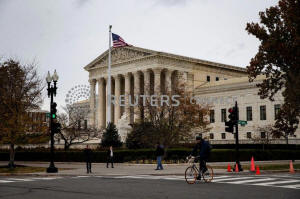|
U.S. top court hands defeat to Hawaii B&B
that spurned lesbian couple
 Send a link to a friend
Send a link to a friend
 [March 19, 2019]
By Lawrence Hurley [March 19, 2019]
By Lawrence Hurley
WASHINGTON (Reuters) - The U.S. Supreme
Court handed a defeat on Monday to a bed and breakfast owner in Hawaii
who turned away a lesbian couple due to her Christian beliefs, but it
could soon take up another major case on the conflict between gay and
religious rights.
The justices refused to hear an appeal by Phyllis Young, who runs the
three-room Aloha Bed & Breakfast in Honolulu, of a lower court's ruling
that she violated a Hawaii anti-discrimination law by refusing to rent a
room to Diane Cervilli and Taeko Bufford in 2007.
A state court ruled that Young ran afoul of Hawaii's public
accommodation law, which among other things bars discrimination on the
basis of sexual orientation. Litigation will now continue to determine
what penalty Young might face.
The Supreme Court's action came nine months after it sided on very
narrow grounds with a Colorado baker who refused to make a wedding cake
for two men, citing his Christian beliefs. The justices could decide as
soon as next week whether to take up a strikingly similar case from
Oregon in which a bakery refused to make a wedding cake for a lesbian
couple for religious reasons.

The Colorado baker decision did not resolve the question of whether
business owners can claim religious exemptions from anti-discrimination
laws. The court, however, did reaffirm in the baker ruling that
businesses open to the public must serve everyone.
Young, who is Catholic, said her decision to turn away Cervilli and
Bufford was protected by her right to free exercise of religion under
the U.S. Constitution's First Amendment. Young also argued that Hawaii
did not give her fair notice that her business was covered by the public
accommodation law.
"The freedom of religion does not give businesses a right to violate
non-discrimination laws," said Peter Renn, a lawyer with gay rights
group Lambda Legal who represents Cervilli and Bufford, who are no
longer a couple. "The Supreme Court declined to consider carving out an
exception from this basic principle when a business discriminates based
on the sexual orientation of its customers."
James Hochberg, Young's lawyer, said his client was merely trying to
work in accordance with her religious beliefs.
"The government went after Mrs. Young's constitutionally protected
freedom simply for adhering to her faith on her own property. This kind
of governmental coercion should disturb every freedom-loving American no
matter where you stand on marriage," Hochberg added.
[to top of second column]
|

A man rides a bicycle past the Supreme Court in Washington, U.S.,
November 13, 2018. REUTERS/Al Drago/File Photo

At Young's bed and breakfast, "the only romantic partners allowed to
share a bedroom are a married man and woman," her lawyers said in
court papers.
The justices avoided a broad ruling in the Colorado case by merely
deciding that a state commission did not handle the case against the
baker appropriately and sent the dispute back for further
proceedings. In October, the commission threw out its case against
the baker.
The Supreme Court in that case also did not address important claims
including whether baking a cake is a kind of expressive act
protected by the First Amendment's free speech guarantee, a question
not raised in the Hawaii case.
The baker ruling was written by Justice Anthony Kennedy, a champion
of gay rights and author of the 2015 ruling legalizing gay marriage.
Kennedy retired last year and was replaced by Brett Kavanaugh,
President Donald Trump's second appointee to the court. During his
Senate confirmation hearings last September, Kavanaugh declined to
discuss his views on gay marriage. He was not involved in any gay
rights cases in 12 years as an federal appeals court judge.
Of the 50 states, 21 including Hawaii, Colorado and Oregon have
anti-discrimination laws protecting gay people. In the Hawaii case,
Cervilli and Bufford sued in 2011 and were joined in the litigation
by the state's civil rights commission.
The cake cases, along with similar litigation around the country
concerning photographers and florists, are part of a conservative
Christian backlash to the 2015 gay marriage ruling.
(Reporting by Lawrence Hurley; Editing by Will Dunham)
[© 2019 Thomson Reuters. All rights
reserved.]
Copyright 2019 Reuters. All rights reserved. This material may not be published,
broadcast, rewritten or redistributed.
Thompson Reuters is solely responsible for this content.

 |